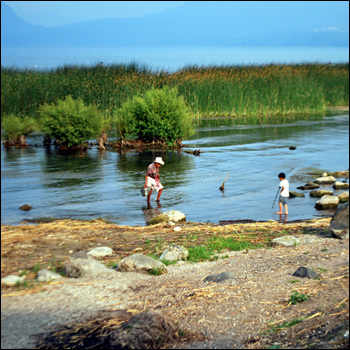
It is true that planet Earth became delimited as a natural outcome of its own formation. The continents had their boundaries in the oceanic waters; the landscape was one vast expanse barely broken by emerging mountain ranges, chains of smoking volcanoes and endless tempests. Many millions of years have passed since then.
This means that the territories and the composition of ethnic frontiers, which emerged only a few thousand years ago, take up no more than a few seconds in geological time, which is read in strata and deep gorges, eroded by the passing of the wind and the water.
Later, empires arose. The incipient national borders began to fade, absorbed by the longing for riches that maintained lavish kingdoms and imperial courts, followed ultimately by modern imperialism, with its multinational trusts, corporations, etc.
For centuries now, limits have been imposed through fratricidal wars pitting fraternal peoples against each other to produce systems that enable domination and exploitation of natural resources and people. Once the new frontiers are drawn according to “the rules,” that is, cutting up ethnic territories and rational ecological units, these limits only serve as a pretext for the defence of the empires’ own interests, which violate them every time circumstances require, uncaring about life as a whole or all it represents.
Demented and perverse are words that describe those who feed off people’s pain; in particular, that of those who have the least, but who are the owners of that which is the most valued: the land that feeds them and enables their social reproduction. However, these epithets hide behind concepts such as democracy, liberty and others like them that no one understands, but that are used cynically to trample others’ rights, enclosed within the apparently inviolable borders of states that accept dependence.
Likewise, religions and legislation were invented that enable local oligarchies to wash their hands when necessary, or to use their litanies to drug those who have lost their bearings of identity and future. In any case, it all works marvellously: the masters walk around the backyard giving orders, with the subsoil, water, fields, and naturally, the people who make and build their dreams on them, at their disposal. Inside the manor, the majordomos protect the interests of the empire with forces of repression, willing to attack and destroy any attempt at revolt with utmost cruelty.
Conclusion: frontiers that divide peoples serve only for domination. Likewise, if the world of exploitation and death is organized from the outside, then the world of social clarity should likewise be organized from within, whose historical and cultural base teaches us the connection among territories with a natural logic that makes rational, complementary use of their resources.
This is, at the base of the coming years, hard ones, or perhaps even harder than those we have endured so far, the key element for survival of the struggle for the reconstruction of ethnic and cultural territories, without borders measured in centimetres, but with areas of integration that enable the permeability of a world that should be just one, but not globalized for the benefit of the few.
The greatest clue to achieving this objective is in the history of the people, seen and read by they themselves. In addition, comprehension of a world in constant flux, but seen from the changes that have occurred in the past several centuries, should integrate the mixing of peoples as a piece that is also crucial in the society we seek to build. Because, in the end, the Earth with its strength offers us opportunity without absorbing us. It presents us with the rules of the game but it does not subordinate us as if we were automatons. It woos us with its magic, before leaving us without answers.
Chimaltenango, 20 de April de 2010
Jaime Idrovo Urigüen
EQUIPO COMUNICÁNDONOS

